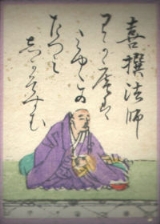
Kisen
Encyclopedia

Heian period
The is the last division of classical Japanese history, running from 794 to 1185. The period is named after the capital city of Heian-kyō, or modern Kyōto. It is the period in Japanese history when Buddhism, Taoism and other Chinese influences were at their height...
and poet. Little is known about his life other than that he lived in Ujiyama.
When Ki no Tsurayuki
Ki no Tsurayuki
was a Japanese author, poet and courtier of the Heian period.Tsurayuki was a son of Ki no Mochiyuki. He became a waka poet in the 890s. In 905, under the order of Emperor Daigo, he was one of four poets selected to compile the Kokin Wakashū, an anthology of poetry.After holding a few offices in...
wrote the of the Kokinshū, he selected Kisen as one of the whose work was to be considered as superior. Tsurayuki says the following to comment on Kisen's work.
- ことばかすかにして 始め終り たしかならず。
- kotoba kasuka ni shite hajime wohari tashikanarazu. (note: exact transcription using classical kanaKanaKana are the syllabic Japanese scripts, as opposed to the logographic Chinese characters known in Japan as kanji and the Roman alphabet known as rōmaji...
orthography) - The use of words is a delicate thing—from start to end it does not express the thing that actually is.
- いはば、 秋の月を見るに、 暁の雲に あへるが ごとし。
- ihaba, aki no tsuki wo miruni, akatsuki no kumo ni aheru ga gotoshi.
- That is to say, to speak of the autumn moon, one compares it to the clouds at dawn.
Kisen is sometimes said to be the author of the poetry collection (also known as the ), but it is probably apocryphal and created well after the end of the Heian period
Heian period
The is the last division of classical Japanese history, running from 794 to 1185. The period is named after the capital city of Heian-kyō, or modern Kyōto. It is the period in Japanese history when Buddhism, Taoism and other Chinese influences were at their height...
.
The following two of Kisen are the only poems that can be confidently traced back to him.
- わが庵は都の辰巳しかぞすむ世を宇治山と人はいふなり
- waga iho ha miyako no tatsumi shika zo sumu yo wo ujiyama to hito ha ifu nari
- Loosely: People say that I am a secluded hermit living in Ujiyama, but my hermitage is just to the southeast of the capital!
- 木の間より見ゆるは谷の蛍かもいさりに海人の海へ行くかも
- ki no ma yori miyuru ha tani no hotaru kamo isari ni ama no umi he yuku kamo
- Loosely: What I see through the trees seems to be the from the valley—or is that the of the fishermen as they head to the sea?

